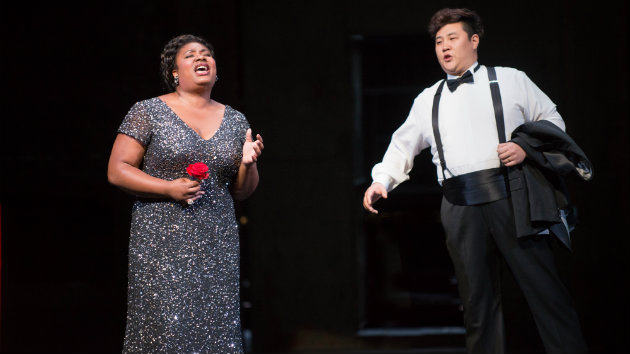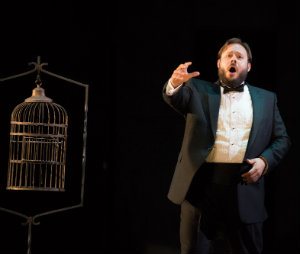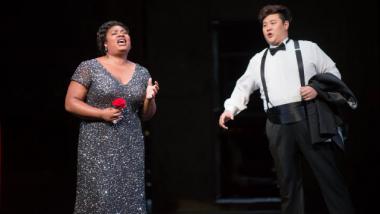
Presented at season’s end as a kind of home run derby for San Francisco Opera’s annual summer training program for singers, coach/accompanists, and stage directors, the Merola Grand Finale transcends its format. As one singer after another gets his or her turn at bat on the big playing field of the War Memorial Opera House, the arias and ensembles reveal deeper stories about artistic aspiration.
The 2015 edition on Saturday, August 22, was no exception. Beyond the score card of big hits, medium-distance shots, and a few swings and misses, mini-narratives — about the rigors, rewards and captivation of opera — kept unfolding. The result was a touching evening full of abundant promise and an equal measure of uncertainty. Two hours and 45 minutes, it seemed, was barely enough to contain it all.
While some of these young artists seemed precociously ready for primetime, others still have room – and time – to grow. What no one can say is which names will ultimately rise. Talent is essential. Perseverance, hard work, and luck are the forces that turn innate gifts into full-fledged careers. It was hard not to feel the poignance of that equation as the Merola soloists followed each other onstage and gave their all. The contours of the future kept forming – he’s a sure thing; she’s a diva waiting to be found; that voice is just too small – and dissolving all night.
Some of the stories were about technique. Almost everyone sang with impressive breath control and liquid phrasing. Missed notes were few and far between. Vocal tone ranged from lustrous to spare but pretty. Diction, apparently well coached, sounded clear and effective in multiple languages.
Other things came up short. A number of the basses and bass baritones faded and went porous at the lower end of their range. Some of the bel canto ornamentation came off as cautious and studied. Projection was in variable supply. So were acting, movement, and stage presence. This was reckless singing in the best sense – thunderous, scalding, remorseless, all of it brought to life with characters that seemed instantly three dimensional.
And then, suddenly, everything came together. The future, it seemed, had arrived in full force. It happened in the first half of the program when Tara Curtis focused her keen, bright mezzo, darkened with raw edges, on “Condotta ell’era in ceppi” from Verdi’s Il Trovatore. Tenor Michael Papincak lent able support on this thrill ride.
The high point of the second half came when mezzo Raehann Bryce-Davis and baritone Kihun Yoon powered their way through a scene of sexual jealousy and intrigue from Mascagni’s Cavalleria Rusticana. This was reckless singing in the best sense – thunderous, scalding, remorseless, all of it brought to life with characters that seemed instantly three dimensional. It was like being air-lifted into the middle of a fully realized production. Never mind that Bryce-Davis and Yoon, like everyone else, were wearing formal wear and not costumes. You believed in them absolutely.
Invidious as they may be, comparisons are unavoidable. The Cav duet came right after a scene from a Humperdinck’s Hänsel und Gretel, headlined by the sweetly tremulous soprano Madison Leonard as Gretel, and mezzo Nicole Woodward, her Hänsel acting and sounding as briefly brave as he/she could. Their prayer scene was lovely and tender. And still, it was hard not to feel that the grownups had arrived when Bryce-Davis and Yoon stormed the stage right afterwards.

Two extracts from Jake Heggie’s Moby-Dick invited another comparison. In Starbuck’s tense address to a sleeping Ahab, baritone Alex DeSocio made the stronger impression, his voice seething and soaring to a musket-bearing frenzy that left the listener in fear for Ahab’s life. There were three Tchaikovsky extracts on the bill, with soprano Meredith Mecum faring better in her first scene from The Queen of Spades (with baritone Sol Jin) than in her somewhat grainy solo later on.
In some cases, the pleasures and the problems were inextricably bound. Tenor Christopher Bozeka and soprano Amina Edris sounded best when their gleaming lyrical voices were braided together in a fervent love scene, the longest of the night, from Gounod’s Roméo et Juliette. But neither was at all convincing as a young lover.
The San Francisco Opera’s factory-look set for its forthcoming production of Sweeney Todd proved more suitable for some scenes (such as an encounter with Mephisopheles in Gounod’s Faust) than others (Mozart’s Die Zauberlflöte, in which a winning if somewhat statically vexed bass baritone Austin Siebert had to tootle Papagano’s pipes in a decidedly non-bucolic setting.)
Stage director Mo Zhou seemed unfazed, using a few props – a birdcage-and-candle, a few umbrellas, blood-red roses – for visual continuity. With an alert Antony Walker in the pit, the turns and swerves in musical styles came off handsomely. He opened the proceedings with well-detailed, broad-beamed reading of the Prelude to Hänsel und Gretel.
Those red flowers served as a final flourish, when tutti Merolini joined in a choral closer from Offenbach’s Les Contes d’Hoffmann. Each singer raised a blossom high, as if to illuminate, with their tiny floral lanterns, the long and winding road ahead.

